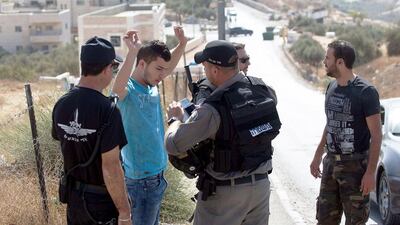The conflict between Israelis and Palestinians over the past 30 years has been marked by two great uprisings, or intifadas, against occupation. With violence rising over the past month, the talk is whether a new intifada is brewing.
As someone who covered the outbreak of the second intifada in September 2000 as a reporter, I can see some clear similarities between then and now. Both erupted at a time when the so-called peace process had broken down and there was no hope of progress towards a Palestinian state.
The second intifada broke out two months after Yasser Arafat, the Palestinian leader, returned from failed peace talks in Camp David. This year, following the failure of US secretary of state John Kerry’s attempt to restart a peace process and with the Middle East focus on Syria, Yemen, Iraq and Iran, the Palestinians feel more abandoned than at any time in recent memory.
The second similarity is the religious symbolism of the Al Aqsa mosque in Jerusalem. The second intifada erupted after a visit by Ariel Sharon, then the leader of the Israeli opposition, to the Haram Al Sharif, which includes the mosque and, according to Jewish tradition, is the site of the Jewish temple destroyed by the Romans in AD70.
The visit was provocative for two reasons: Sharon was burnishing his right-wing credentials to fend off a leadership challenge by Benjamin Netanyahu – the current prime minister, who had just been cleared of involvement in a political scandal. And it was aimed at showing that the Israeli right would never compromise on sovereignty over the Haram, as had been discussed at the failed Camp David talks by the then-prime minister Ehud Barak.
Today Al Aqsa is a mobilising force because Palestinians believe that Israel is intent on encroaching on Muslim holy places. There are many signs of this: the rabbinical taboo on Jews visiting the site is no longer applied, and thousands of Jews visit every year. Groups campaigning for a change in the status quo are vocal and include cabinet ministers. Large sums of money are raised for the construction of a Jewish “third temple” on the site.
Mr Netanyahu says he has no intention of changing the prayer arrangements or demolishing the Islamic holy sites. But given the slow advance of Jewish preogative in the shared holy site in Hebron known to Jews as the Cave of the Patriarchs and to Muslims as the Ibrahimi Mosque, Palestinians are not inclined to trust him.
Away from these similarities, the differences are far more apparent. The most obvious one is leadership. The first intifada was led by underground civic mobilisation groups. The second was secretly encouraged by Arafat, though he kept his links with the leaders at arm’s length. Weakened by ceaseless encroachment of Israeli settlements on Palestinian land, Arafat seems to have believed that an uprising with guns would strengthen his position and, just as the first intifada had led to the Madrid peace conference and then the Oslo peace accords, a second would hasten the establishment of a state.
Arafat was wrong. The Israeli army laid waste to the Palestinian infrastructure built up over a decade.
Today, the Palestinian president, Mahmoud Abbas, is not in control. Indeed, for many Palestinians, he is as much a part of the problem as the Israelis. The spontaneous nature is not surprising: no leader can see anything concrete to gain from violence, nor much to lose.
Jeff Halper, an Israeli activist for Palestinian rights and founder of the Israeli Committee against House Demolitions, says Palestinians now see no alternative to occupation, imprisonment and apartheid. “Israel is saying to the Palestinians, the conflict is over, there is no more peace process. There will never be a Palestinian state. You are going to be imprisoned. Submit, leave or die.”
If there is one lesson from the intifadas it is that each one increases the separation between the Palestinian and Jewish communities. Up until the late 1980s, Palestinians crossed freely into Israel to work, prompting an economic boom in the West Bank and Gaza Strip. By the end of the first intifada, the Israelis had instituted a policy of regular “closures”, sealing off the Palestinian territories. By the end of the second intifada, Israel had built a physical barrier from the north to the south, sealing off Israel, the major Jewish settlements and other Palestinian territories it wanted to expropriate.
This has allowed the Israeli public to forget about the Palestinians, hidden behind a wall. The Palestinians who used to work in Israel have been replaced by 200,000 migrant workers mainly from Thailand and the Philippines. Most Palestinians never see an Israeli except in uniform with a gun. Usually they are settlers, armed auxiliaries of the Israeli army who are the presumed culprits of the firebombing in August of the Palestinian Dawabsheh family.
The past week has seen the imposition of “closure” inside East Jerusalem, with checkpoints being set up to isolate some areas of the city. Residents of East Jerusalem are an anomaly in the occupied territories – they have Israeli identity cards (but not citizenship) which allow them to travel freely in the city and throughout Israel. Most of the people who have attacked Israelis over the past month have been East Jerusalemites.
The legacy of this violence will be even harsher security measures against the Palestinians of East Jerusalem, including expulsions of families of attackers and the demolition of their homes.
Ultimately it does not matter whether this year’s violence counts as another intifada or a brief and ill-directed outburst of rage. These are all stages in a process which, for all the years of “peace process”, is seen differently by the two sides. For the Israeli security establishment it is a mopping-up operation at the end of the conflict. For each new generation of Palestinians, it is a continuing struggle for rights.
Alan Philps is a commentator on global affairs
On Twitter: @aphilps

